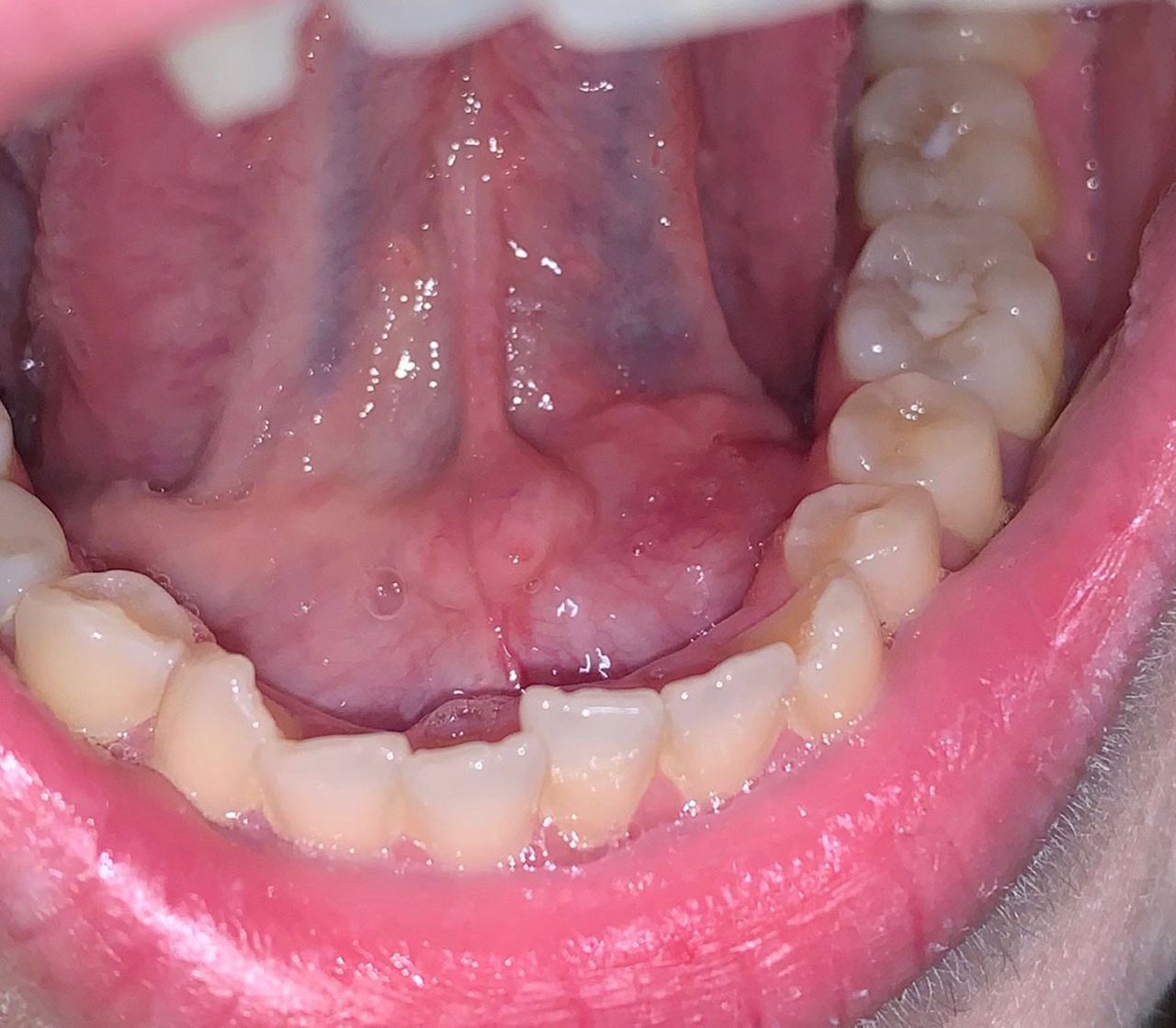Hey there! Experiencing a swollen roof of your mouth? This comprehensive guide covers everything you need to know about this common issue, from potential causes and telltale symptoms to effective treatments and when to seek professional help. Whether it’s a minor irritation or causing you significant pain, we’ll help you understand what’s going on and how to find relief.
Decoding the Discomfort: Understanding the Causes
A swollen roof of your mouth, also known as your palate, can be triggered by a surprisingly wide range of factors. Let’s explore some of the most common culprits:
Injuries and Irritations
- Burns: Sipping on scorching hot coffee or biting into piping hot pizza can scald the delicate tissues of your palate, leading to pain and swelling.
- Accidental Bites: It’s easy to accidentally chomp down on the roof of your mouth while chewing, causing injury and subsequent swelling.
- Irritating Dentures or Dental Work: Ill-fitting dentures or new dental work can rub against your palate, causing irritation and inflammation.
- Smoking and Tobacco Use: The harsh chemicals in tobacco products can irritate the sensitive lining of your mouth, contributing to swelling and other oral health problems.
Infections and Sores
- Canker Sores: These small, shallow ulcers can appear on the roof of your mouth, causing localized pain and swelling. They typically heal on their own within a week or two.
- Cold Sores (Fever Blisters): While more common on the lips, cold sores can occasionally occur inside the mouth, including on the palate, resulting in painful blisters and swelling.
- Oral Thrush: This fungal infection can create white patches and swelling on the roof of your mouth. It’s more common in babies, individuals with weakened immune systems, and those using inhaled corticosteroids.
- Hand, Foot, and Mouth Disease: This contagious viral infection primarily affects children and can cause sores and swelling in the mouth, including the palate, as well as on the hands and feet.
- Sialadenitis (Salivary Gland Infection): An infection of the salivary glands in the roof of your mouth can lead to painful swelling and difficulty swallowing.
Other Potential Causes
- Cysts and Mucoceles: These fluid-filled bumps are usually benign but can cause noticeable swelling on the roof of your mouth.
- Dehydration: Not drinking enough water can disrupt the delicate balance of your oral tissues, potentially contributing to a swollen palate.
- Mucus Buildup: Excess mucus from allergies or a cold can irritate the roof of your mouth and cause swelling.
Recognizing the Red Flags: Symptoms
How can you tell if you have a swollen roof of your mouth? Look out for these common signs:
- Visible Swelling: You might notice a puffy or enlarged area on your palate.
- Redness and Pain: The affected area might appear red and be tender or painful to the touch.
- Blisters, Bumps, or Lesions: Depending on the cause, you may see blisters, bumps, or sores on the roof of your mouth.
- Difficulty Eating or Swallowing: The swelling can make it challenging to eat, swallow, or even talk comfortably.
Soothing the Swelling: Treatment and Home Remedies
Fortunately, there are several ways to alleviate the discomfort of a swollen roof of your mouth:
Home Remedies
- Saltwater Rinses: Rinsing your mouth with warm salt water can soothe irritation and promote healing. Dissolve half a teaspoon of salt in a cup of warm water and swish it around your mouth for 30 seconds several times a day.
- Over-the-Counter Pain Relievers: Ibuprofen (Advil, Motrin) or acetaminophen (Tylenol) can help manage pain and reduce inflammation.
- Topical Anesthetics: Over-the-counter numbing gels or sprays can temporarily numb the area and provide pain relief.
- Hydration and Avoiding Irritants: Staying well-hydrated and avoiding irritating foods (spicy, acidic, hard, or very hot) can aid in healing.
Medical Treatments
While many cases resolve with home care, sometimes professional intervention is necessary. Your doctor might recommend:
- Antibiotics (for bacterial infections): If a bacterial infection is the cause, antibiotics will likely be prescribed.
- Antifungal Medications (for oral thrush): Oral thrush is treated with antifungal medications, which can be in the form of mouthwashes, lozenges, or pills.
- Prescription Medications (for specific conditions): For conditions like mucositis, your doctor may prescribe specialized medications.
When to Seek Professional Help
Consult a doctor if you experience:
- Severe pain unrelieved by over-the-counter medications
- Difficulty breathing or swallowing
- Swelling lasting more than a week
- Fever or other symptoms like body aches or swollen lymph nodes
- Signs of infection such as pus, spreading redness, or increased pain
- No improvement with home remedies
Preventing Future Problems: Ongoing Care
Maintaining good oral hygiene is key to preventing many mouth problems, including a swollen palate.
- Brush and floss regularly.
- See your dentist for checkups and cleanings.
- Avoid irritants like spicy or acidic foods.
- Manage underlying conditions like allergies or dehydration.
- Quit smoking or using tobacco products.
Before getting the stages of a loose tooth in adults, it is imperative to know the risk of getting a root canal first. There are some side effects of root canals you should know before opting for one.
What Causes Swelling in the Roof of My Mouth? A Deeper Dive
Let’s delve deeper into the reasons why your palate might swell. While we’ve covered the basics, understanding the nuances can empower you to take better care of your oral health.
Sores and Infections: A Closer Look
Canker sores, those small, painful ulcers, are a frequent cause of palate swelling. While they usually heal within a week or two, their presence can make eating and talking uncomfortable. Cold sores, caused by the herpes simplex virus, can also appear on the palate, though they are more commonly found on the lips. These fluid-filled blisters can be painful and contagious. Oral thrush, a yeast infection, can cause white patches and swelling on the palate. It’s more prevalent in individuals with weakened immune systems or those taking certain medications.
Injuries: Beyond the Obvious
Beyond burns and bites, other injuries can contribute to palate swelling. Irritation from dentures or braces, for example, can cause the delicate tissues to become inflamed. Even sharp food particles can scratch the palate, leading to discomfort and swelling.
Systemic Factors: The Bigger Picture
Sometimes, a swollen palate can be a symptom of a broader health issue. Autoimmune diseases, for instance, can cause inflammation in various parts of the body, including the mouth. Dehydration can dry out the mucous membranes, making them more susceptible to irritation and swelling. Allergies or a common cold can lead to mucus buildup, which can put pressure on the palate and cause it to swell. Certain medications can also have oral swelling as a side effect.
Lifestyle Choices: Their Impact on Oral Health
Smoking and excessive alcohol consumption can irritate the delicate tissues of the mouth, increasing the likelihood of swelling. Allergic reactions to foods or other substances can also trigger a range of reactions, including swelling in the mouth and palate.
| Potential Cause | More Details |
|---|---|
| Canker Sores | Small, painful ulcers that typically heal within a few weeks |
| Cold Sores | Fluid-filled blisters caused by the herpes simplex virus |
| Injuries | Burns, cuts, irritation from dentures, braces, or sharp food particles |
| Oral Thrush | Yeast infection characterized by white patches and swelling |
| Systemic Issues | Autoimmune diseases, dehydration, allergies, colds, certain medications |
| Lifestyle Choices | Smoking, excessive alcohol use, allergic reactions |
Ongoing research continues to explore the complexities of oral health. While much is known, there’s always more to learn. Some experts suggest that genetics may play a role in susceptibility to canker sores, and there’s ongoing debate on the best management approaches for certain oral conditions. If you’re experiencing persistent swelling, consult a healthcare professional. They can pinpoint the cause and recommend the best course of action. Remember, what we know about health is constantly evolving, and this information is for general knowledge only. Always seek professional medical advice for any health concerns.
Is That Bulge on My Roof of Mouth Concerning? Understanding Palatal Growths
Noticing a bulge on the roof of your mouth can be alarming, but in most cases, it’s nothing serious. Let’s explore the potential causes, ranging from harmless bony growths to more concerning possibilities.
Benign Bony Growths: Torus Palatinus
One of the most common causes of a palatal bulge is torus palatinus, a harmless bony growth that can develop over time. It’s usually hard, painless, and located in the middle of the hard palate. Many people are unaware they have one until a dentist points it out. While typically not a cause for concern, surgical removal might be considered if it interferes with eating, speaking, or dentures.
Sores and Infections: Bulges That Can Cause Discomfort
Sometimes, a bulge might actually be a sore. Canker sores, as discussed earlier, can pop up on the roof of the mouth, causing pain and swelling. Cold sores can also appear on the palate, though they’re more common on the lips. These fluid-filled blisters are caused by the herpes simplex virus and can be contagious.
Cysts: Fluid-Filled Pockets
Several types of cysts can form on the roof of your mouth. Epstein pearls are small, white cysts common in newborns, usually disappearing within a few weeks. Nasopalatine duct cysts form behind the front teeth and might require surgical removal if they become infected or cause discomfort. Mucoceles are mucus-filled cysts that can develop due to blocked salivary glands.
When Should I Worry? Red Flags to Watch For
While most bulges are benign, some warrant medical attention. Seek professional advice if you experience:
- Pain: While torus palatinus is usually painless, pain often accompanies sores or infections.
- Bleeding: A bump that bleeds easily could signal a more serious issue.
- Changes: If a bulge grows rapidly, changes shape or color, or develops other unusual characteristics, consult a doctor.
- Trouble Swallowing or Breathing: In rare cases, a growth can obstruct swallowing or breathing. This is a medical emergency.
- Concern about Oral Cancer: While rare, oral cancer can manifest as a lump or bump. Early detection is crucial, so don’t hesitate to seek professional advice if you are concerned.
What to Expect at the Doctor
If you consult a doctor about a palatal bulge, they will likely ask about its history, associated symptoms, and any changes. A physical exam will be performed, and further tests (biopsy, X-rays, CT scan) might be recommended depending on the suspected cause.
Finding a bulge can be unsettling, but remember, most are harmless. However, it’s always wise to be cautious. Pay attention to accompanying symptoms and seek medical advice when needed. A healthcare professional can provide a proper diagnosis and ensure you receive appropriate treatment if necessary.
- Stainless Steel Food Containers Offer Safe, Sustainable Meal Storage - February 23, 2026
- Meal Prep Lunchbox Makes Healthy Eating Easy and Convenient - February 22, 2026
- Glass Rectangular Storage Containers Keep Your Kitchen Organized - February 21, 2026










